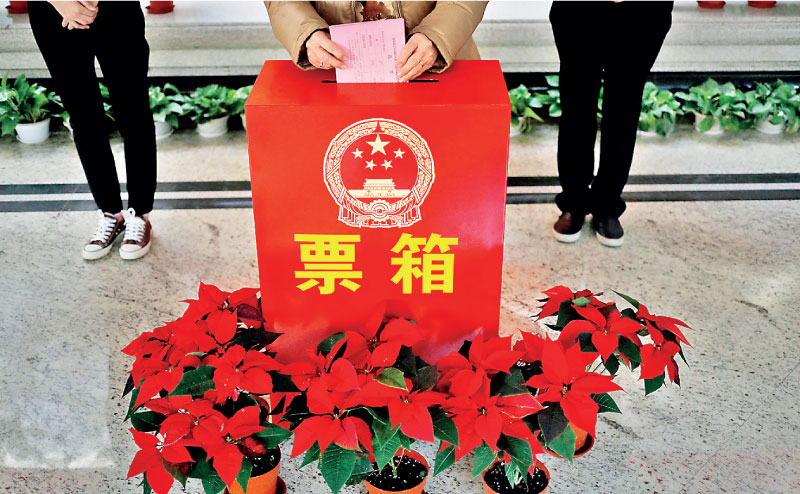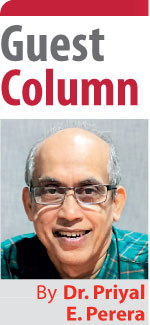Sunday Feb 15, 2026
Sunday Feb 15, 2026
Thursday, 21 April 2022 01:07 - - {{hitsCtrl.values.hits}}

In China, this system is called “selection plus election” which is rooted in Confucian political tradition. Here, competent leaders are selected based on merit, rigorous examinations, popular support, the vigorous process of screening, opinion surveys, internal evaluations, and various small-scale elections
 The right to vote and the right to be elected are two of the most fundamental rights that we cherish. We would never imagine that they could also be an obstacle to our country’s development. Most, despite their limited civic knowledge, would never consider exchanging this franchise for any other political system with lesser rights.
The right to vote and the right to be elected are two of the most fundamental rights that we cherish. We would never imagine that they could also be an obstacle to our country’s development. Most, despite their limited civic knowledge, would never consider exchanging this franchise for any other political system with lesser rights.
Any argument contrary to the preservation of these democratic rights would be anathema to a majority of the people even if there are political systems that have achieved better societal and developmental outcomes without these rights. Despite the frustrations that people feel about the current political environment and the dismal political and economic realities that are expected to unfold in the future, people would still want the status quo to continue.
Article 3 of the 1978 Constitution states that sovereignty includes franchise and it is in the people and is inalienable. So, the Constitution grants us the right to vote and participate in public administration and elect our representatives to Parliament. What is the significance of these rights? How have they served us?
Fundamentally, the right to vote gives us a sense of equality regardless of our wealth, income, gender, social status, race, religion, ethnicity, and political affiliations. Concerning politics, the right to vote allows us the freedom to choose a political party and candidate that validates our social and political identities; someone we think would bring prosperity to ourselves and the entire nation.
Moreover, we feel rewarded knowing the part our vote plays in influencing beneficial outcomes if the outcome is such. So, on the whole, the right to vote or “active suffrage” is beneficial.
The right to be elected or hold public office which we call “passive suffrage” is more nuanced and perhaps less fundamental than the right to vote. This right should come with a great deal of responsibility, accountability, and integrity. Furthermore, the person who has earned this right must possess the knowledge and competence to hold public office.
An elected official’s decision-making has a far-reaching and highly significant impact on the general population and the nation’s wellbeing. In a democratic system, we entrust this right to the elected persons hoping that they would do their utmost to represent and serve us and maximise the nation’s wellbeing. Increasingly it is evident that competent individuals with the above-mentioned traits are in the minority in all governing parties at all levels of the Sri Lankan Government.
Active suffrage and passive suffrage
The real problem here is that of ‘passive suffrage’ that gives anybody the right to participate in the administration of the country, regardless of competence. As such, a person not having passed the ordinary-level or the advanced-level examination nor having the necessary background and competence to command a Government portfolio can still become an elected official in the Parliament.
Naturally, with such individuals, the policy decision-making becomes inferior even when guided by policy advisors, who themselves are in their positions through affiliation with political power.
Why are political parties surrounded by such individuals and not by those possessing the necessary competence in the first place? One simple answer could be that these individuals possess the skills of bringing votes or providing necessary financial means solely for bringing the party to power.
What has happened over time is that all the significant parties have accommodated such individuals, leaving the voter no choice but to vote for these incompetent politicians. This is not a democratic ideal because the voter does not select these individual(s) based on any deserving criteria in the first place.
Although we have the right to change a candidate or a party at the elections, this franchise becomes purposeless if we continuously replace incompetence with incompetence. Furthermore, if elections are held every 4-5 years, substantial damage can be done by these individuals in the interim. Passive suffrage is problematic. It needs careful examination and revision if the country is to be put on a path toward long-term development.
It is highly improbable that laws requiring all parliamentarians to demonstrate competence can be implemented. Now that these individuals are the legislators in the Parliament, it is unlikely that they would want to change the laws that pose an existential threat to them. So, what can Sri Lanka do to emulate countries such as China, Singapore, Taiwan, South Korea, and Japan where successful development has been highly correlated with competent governance?
For a start, we need to educate the average voter about the shortcomings of passive suffrage and how the present politicians have taken advantage of the voter’s active suffrage. The voter must be made to understand why it is better to vote for a person with skills, competence, and aforementioned qualities rather than settle for dubious false promises they have been repeatedly given.
Furthermore, the voter needs to understand that their vote is worth a commitment by a politician who is willing to uphold accountability, integrity, and responsibility.
The legal fraternity should look into “passive suffrage” and suggest ways for incorporating competence as a legal necessity for holding political office. The right to hold office alone should not be sufficient, but other necessary ingredients such as the level of education, skills, past performance in any political/other offices, demonstration of integrity, police history, etc. should be taken into consideration.
The citizen’s right to be governed by the most competent also needs to be addressed. It is time that these archaic suffrage ideas need reexamination. Some may oppose or be cautious about such changes as they may lead to elitist arrangements, but experience in countries such as Singapore and China show that it is a worthwhile endeavour. If constitutional changes are necessary, these are the quintessential changes that can bring the greatest value to the country.
Another alternative would be to encourage forming new political parties based on political meritocracy. Both Singapore and China have successfully incorporated meritocratic principles into their political systems. Today, their enormous success has been mainly attributed to this system of meritocracy where political leaders with above-average ability and virtue are selected by a mechanism designed to choose such leaders to manage their respective countries.
In China, this system is called “selection plus election” which is rooted in Confucian political tradition. Here, competent leaders are selected based on merit, rigorous examinations, popular support, the vigorous process of screening, opinion surveys, internal evaluations, and various small-scale elections.
Recent surveys have shown that there is widespread support for this idea of political meritocracy in East Asian societies. It is true that meritocracy and liberal democracy are inconsistent. However, forming political parties based on meritocracy distinguishes those parties from the current ineffective and corrupt political parties.
Whatever the path Sri Lanka takes, it should eliminate the incompetence in political office. The political and economic woes of the last seven decades have shown that leaving the country’s governance to passive suffrage is a detrimental idea that requires a rethink.
(The writer is currently a sessional lecturer in Economics at both Charles Sturt University and La Trobe University in Australia. He has also tutored for the Department of Financial & Management Studies (DeFiMS) in the School of Oriental & African Studies (SOAS) at the University of London. The author can be contacted at: www.ourfuturewechoose.com.)